Journal of Southern Medical University ›› 2025, Vol. 45 ›› Issue (9): 2006-2018.doi: 10.12122/j.issn.1673-4254.2025.09.20
Yu ZHANG1( ), Haitao LI1, Yuqing PAN2, Jiexian CAO2, Li ZHAI1, Xi ZHANG1(
), Haitao LI1, Yuqing PAN2, Jiexian CAO2, Li ZHAI1, Xi ZHANG1( )
)
Received:2025-05-15
Online:2025-09-20
Published:2025-09-28
Contact:
Xi ZHANG
E-mail:15520858743@163.com;zhangxi@kmmu.edu.cn
Yu ZHANG, Haitao LI, Yuqing PAN, Jiexian CAO, Li ZHAI, Xi ZHANG. Pan-cancer analysis of MZB1 expression and its association with immune infiltration and clinical prognosis[J]. Journal of Southern Medical University, 2025, 45(9): 2006-2018.
Add to citation manager EndNote|Ris|BibTeX
URL: https://www.j-smu.com/EN/10.12122/j.issn.1673-4254.2025.09.20
| Cancer type abbreviation | Full name of cancer type |
|---|---|
| ACC | Adrenocortical carcinoma |
| BLCA | Bladder urothelial carcinoma |
| BRCA | Breast invasive carcinoma |
| CESC | Cervical squamous cell carcinoma and endocervical adenocarcinoma |
| CHOL | Cholangiocarcinoma |
| COAD | Colon adenocarcinoma |
| COADREAD | Colon adenocarcinoma/rectum adenocarcinoma esophageal carcinoma |
| ESCA | Esophageal carcinoma |
| GBM | Glioblastoma multiforme |
| GBMLGG | Glioma |
| HNSC | Head and neck squamous cell carcinoma |
| KICH | Kidney chromophobe |
| KIPAN | Pan-kidney cohort (kich+kirc+kirp) |
| KIRC | Kidney renal clear cell carcinoma |
| KIRP | Kidney renal papillary cell carcinoma |
| LAML | Acute myeloid leukemia |
| LGG | Brain lower grade glioma |
| LIHC | Liver hepatocellular carcinoma |
| LUAD | Lung adenocarcinoma |
| LUSC | Lung squamous cell carcinoma |
| MESO | Mesothelioma |
| OV | Ovarian serous cystadenocarcinoma |
| PAAD | Pancreatic adenocarcinoma |
| PCPG | Pheochromocytoma and paraganglioma |
| PRAD | Prostate adenocarcinoma |
| READ | Rectum adenocarcinoma |
| SARC | Sarcoma |
| STAD | Stomach adenocarcinoma |
| SKCM | Skin cutaneous melanoma |
| STES | Stomach and esophageal carcinoma |
| TGCT | Testicular germ cell tumors |
| THCA | Thyroid carcinoma |
| THYM | Thymoma |
| UCEC | Uterine corpus endometrial carcinoma |
| UCS | Uterine carcinosarcoma |
| WT | High-risk wilms tumor |
Tab.1 English abbreviations of relevant cancers in pan-cancer data
| Cancer type abbreviation | Full name of cancer type |
|---|---|
| ACC | Adrenocortical carcinoma |
| BLCA | Bladder urothelial carcinoma |
| BRCA | Breast invasive carcinoma |
| CESC | Cervical squamous cell carcinoma and endocervical adenocarcinoma |
| CHOL | Cholangiocarcinoma |
| COAD | Colon adenocarcinoma |
| COADREAD | Colon adenocarcinoma/rectum adenocarcinoma esophageal carcinoma |
| ESCA | Esophageal carcinoma |
| GBM | Glioblastoma multiforme |
| GBMLGG | Glioma |
| HNSC | Head and neck squamous cell carcinoma |
| KICH | Kidney chromophobe |
| KIPAN | Pan-kidney cohort (kich+kirc+kirp) |
| KIRC | Kidney renal clear cell carcinoma |
| KIRP | Kidney renal papillary cell carcinoma |
| LAML | Acute myeloid leukemia |
| LGG | Brain lower grade glioma |
| LIHC | Liver hepatocellular carcinoma |
| LUAD | Lung adenocarcinoma |
| LUSC | Lung squamous cell carcinoma |
| MESO | Mesothelioma |
| OV | Ovarian serous cystadenocarcinoma |
| PAAD | Pancreatic adenocarcinoma |
| PCPG | Pheochromocytoma and paraganglioma |
| PRAD | Prostate adenocarcinoma |
| READ | Rectum adenocarcinoma |
| SARC | Sarcoma |
| STAD | Stomach adenocarcinoma |
| SKCM | Skin cutaneous melanoma |
| STES | Stomach and esophageal carcinoma |
| TGCT | Testicular germ cell tumors |
| THCA | Thyroid carcinoma |
| THYM | Thymoma |
| UCEC | Uterine corpus endometrial carcinoma |
| UCS | Uterine carcinosarcoma |
| WT | High-risk wilms tumor |
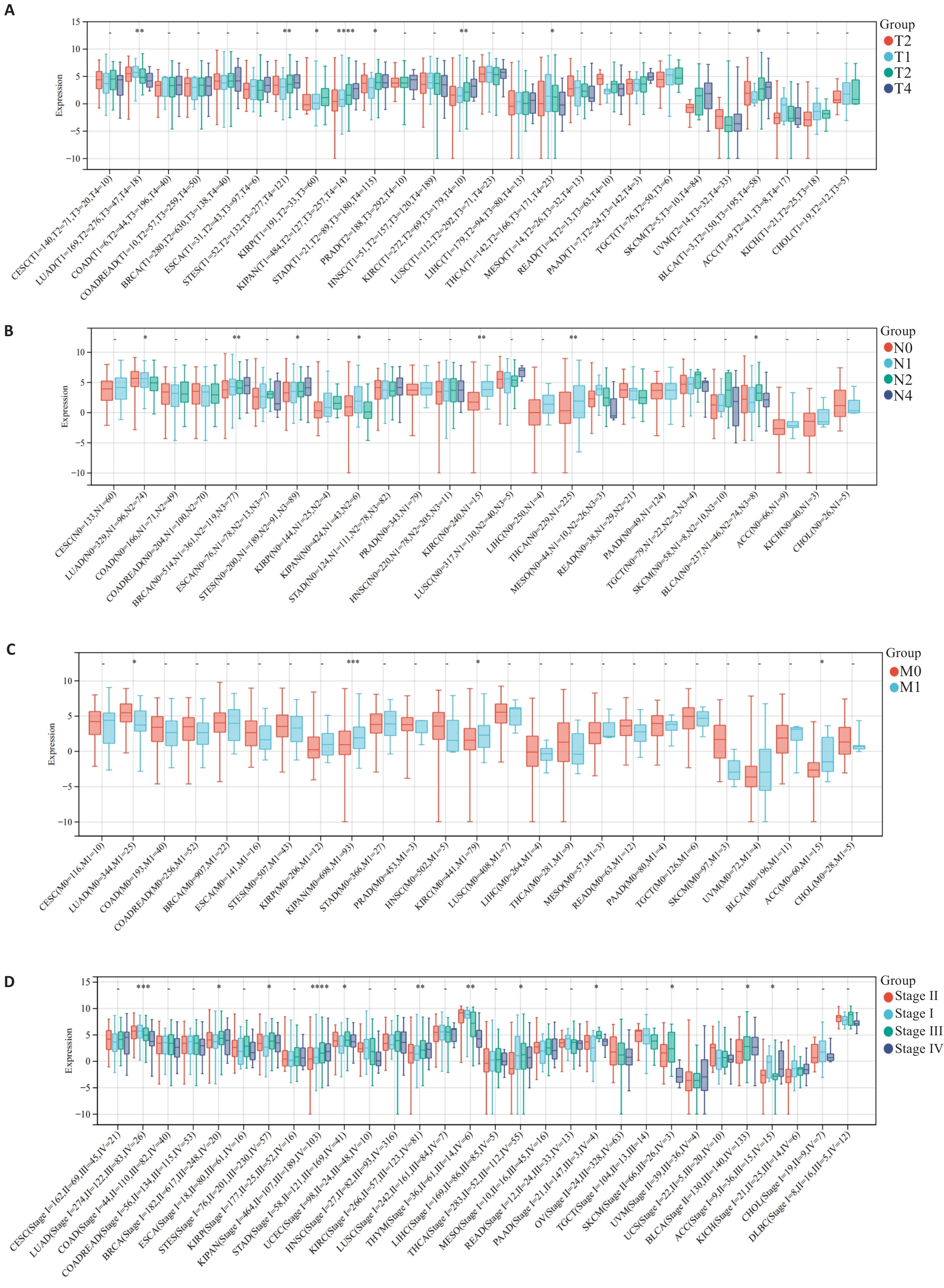
Fig.2 Relationship between MZB1 and tumor pathological stage. A-C: Relationship between MZB1 and tumor TNM stage. D: Relationship between MZB1 and tumor stage. *P<0.05, **P<0.01, ***P<0.001.
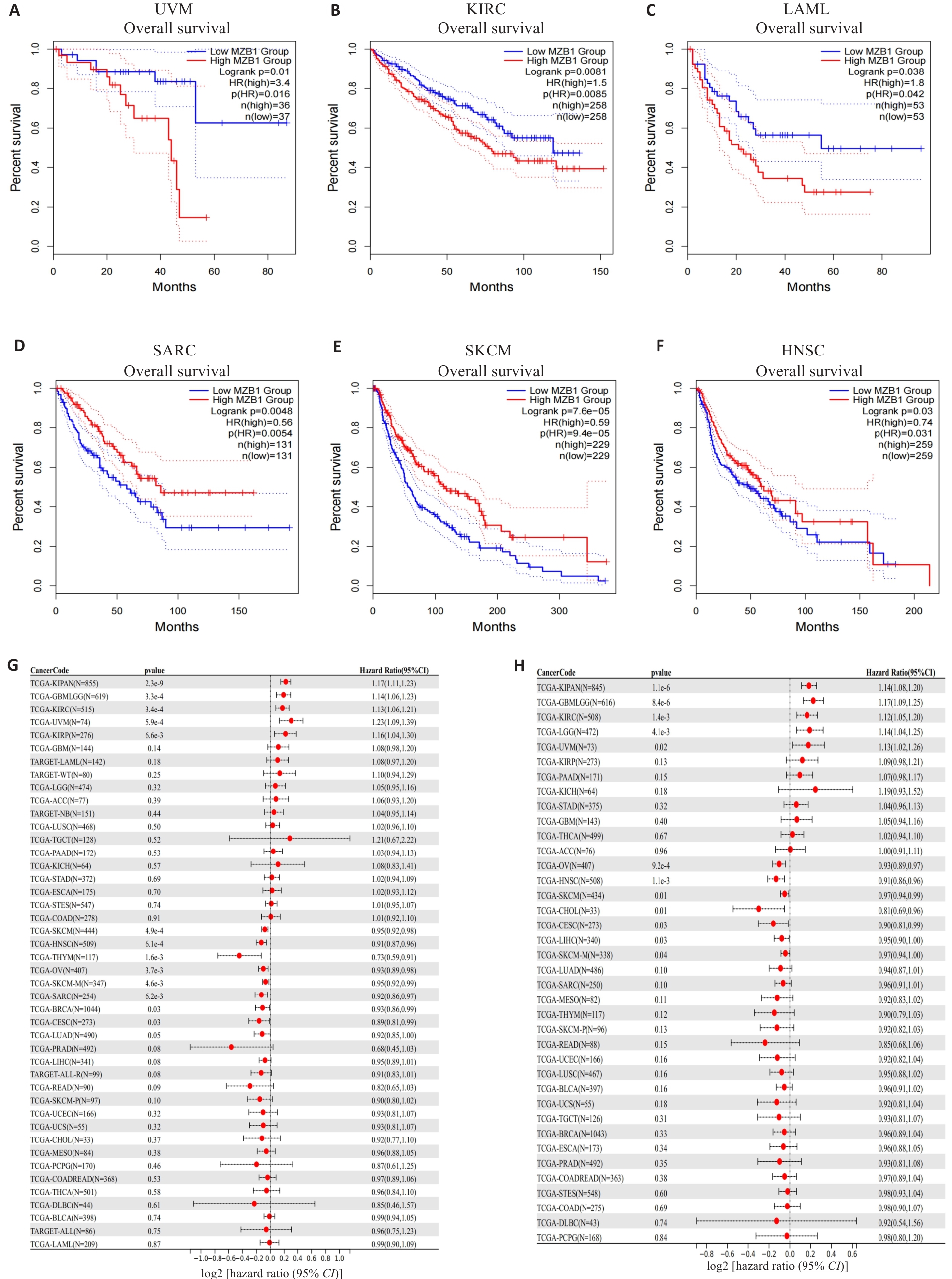
Fig.3 Effect of MZB1 on cancer prognosis. A-F: Kaplan-Meier survival curves of MZB1 expression in UVM, KIRC,LAML, SARC, SKCM, and HNSC. G, H: Prognostic analysis of the effect of MZB1 expression on overall survival (G) and progression-free survival (H).
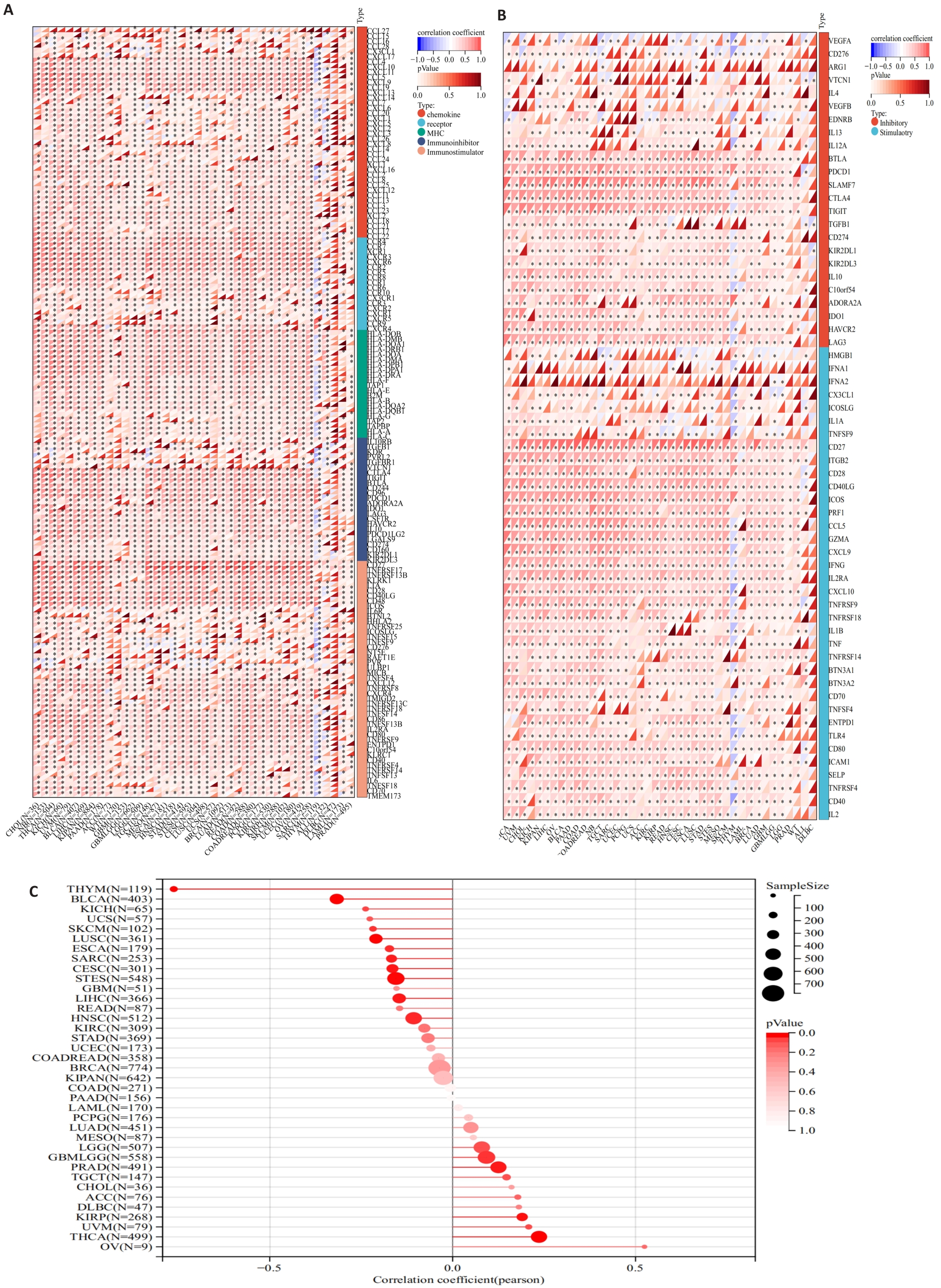
Fig.4 Immunological characterization of MZB1 and correlation between MZB1 and tumor stemness. A: Relationship between MZB1 and immunomodulatory genes. B: Relationship between MZB1 and immune checkpoint genes. C: Relationship between MZB1 and tumor stemness indices.
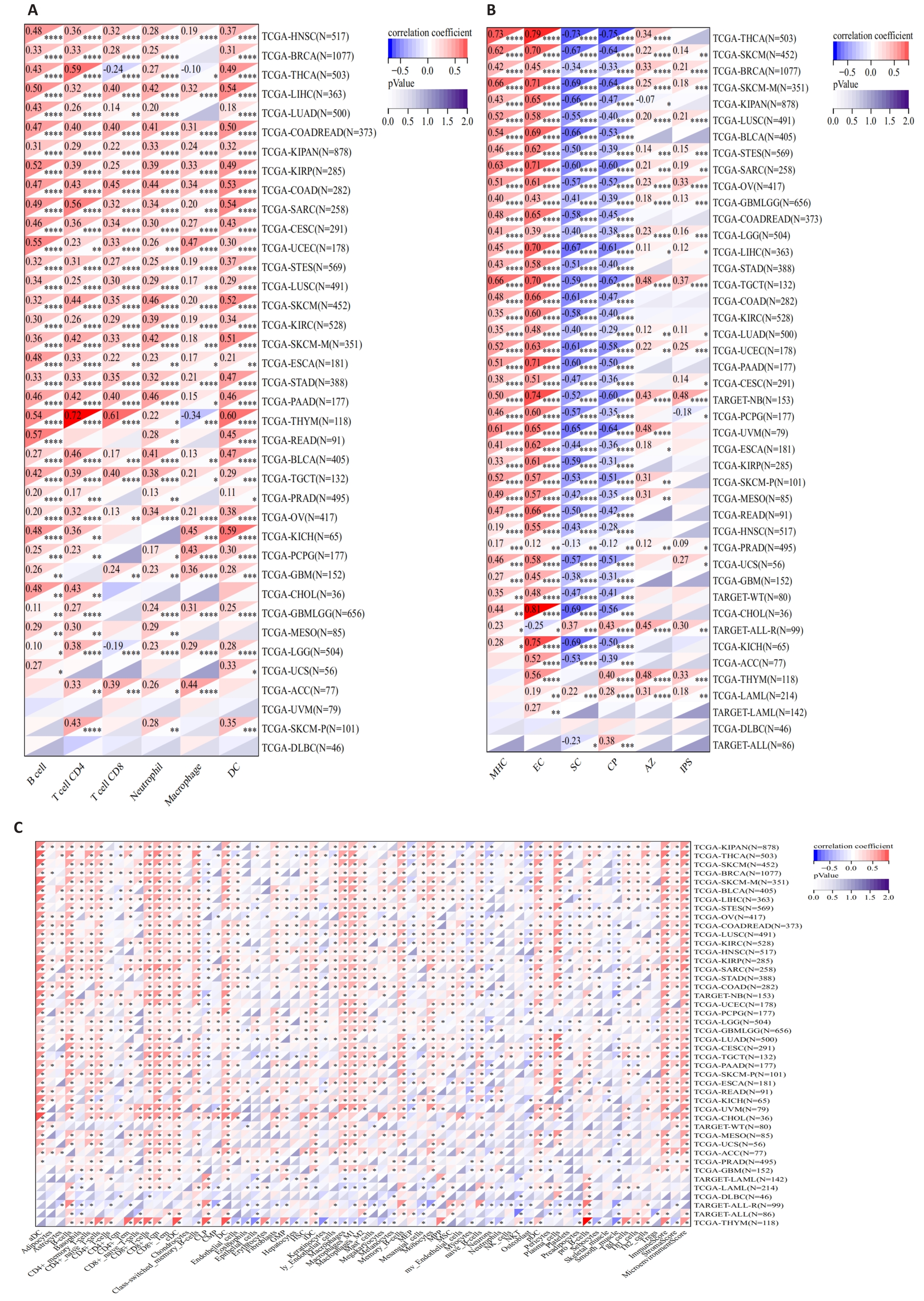
Fig.5 Correlation between MZB1 and immune cell infiltration levels in pan-cancer. A: TIMER. B: IPS. C: xCELL. *P<0.05, **P<0.01, ***P<0.001, ****P<0.0001.
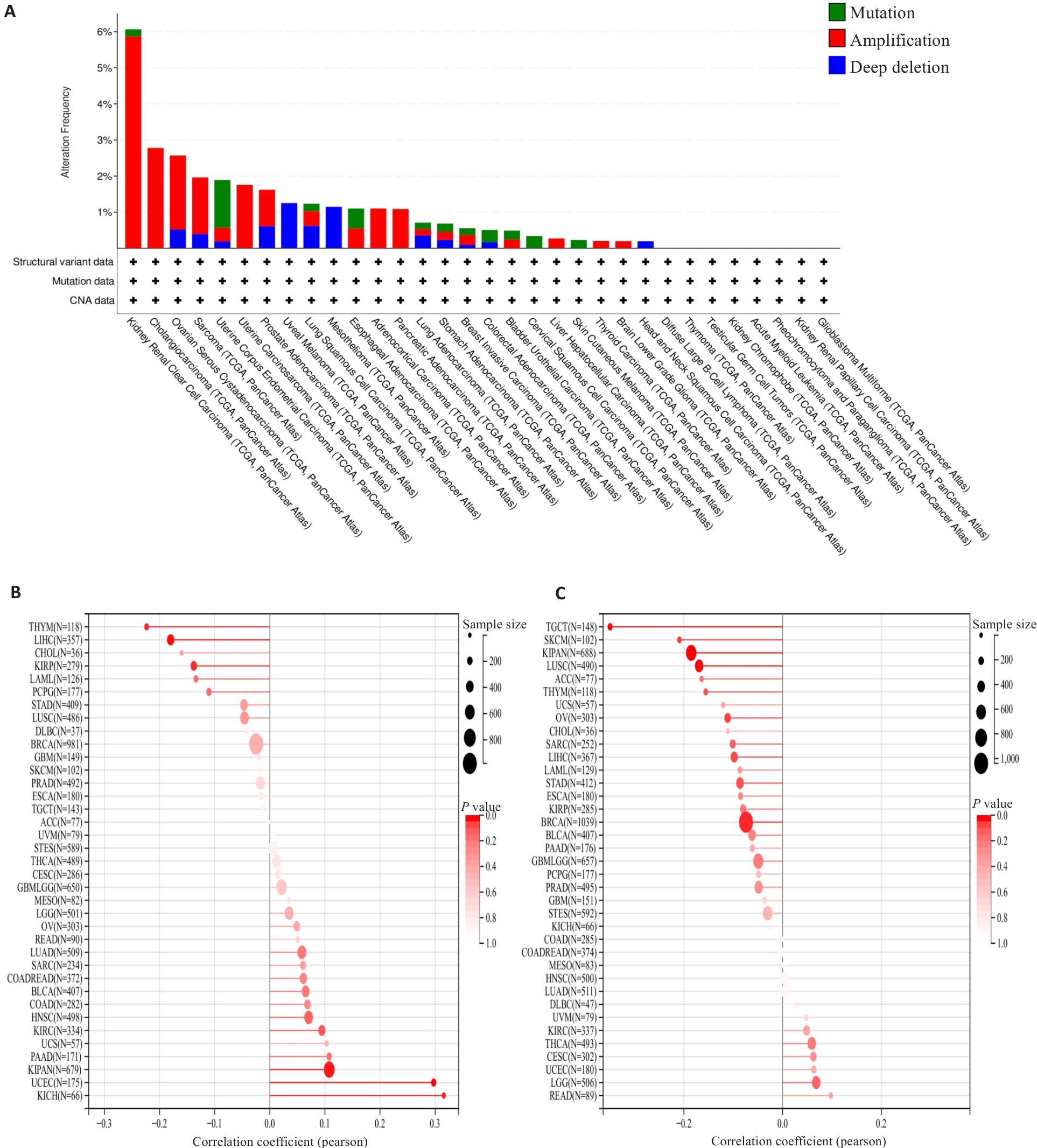
Fig.6 Mutation analysis of MZB1 and its correlation with TMB and MSI. A. Mutation analysis of MZB1 in tumors. B: Correlation of MZB1 with tumor TMB. C: Correlation of MZB1 with tumor MSI.
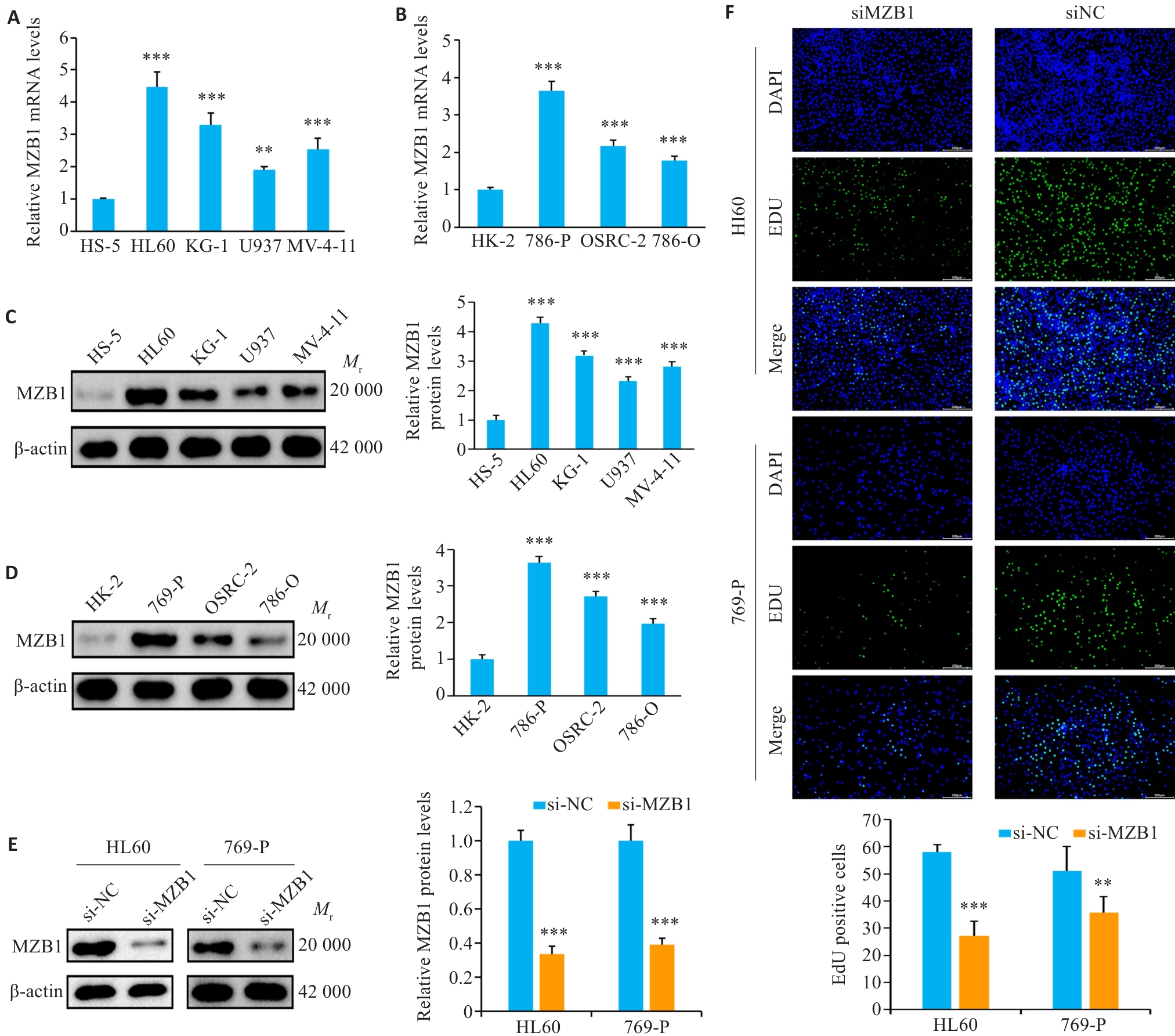
Fig. 8 In vitro validation of MZB1 expression and functional assays in leukemia and renal carcinoma cell lines. A-D: Expression of MZB1 in leukemia and renal carcinoma cell lines determined using RT-qPCR and Western blotting. E: Expression levels of MZB1 in HL60 and 769-P cells following MZB1 knockdown. F: Changes in cell proliferation capacity after MZB1 knockdown assessed using EdU assay (scale bar= 200 μm). **P<0.01, ***P<0.001 vs HS-5/HK-2/si-NC.
| [1] | Bray F, Laversanne M, Sung H, et al. Global cancer statistics 2022: GLOBOCAN estimates of incidence and mortality worldwide for 36 cancers in 185 countries[J]. CA Cancer J Clin, 2024, 74(3): 229-63. doi:10.3322/caac.21834 |
| [2] | Li QR, Xia CF, Li H, et al. Disparities in 36 cancers across 185 countries: secondary analysis of global cancer statistics[J]. Front Med, 2024, 18(5): 911-20. doi:10.1007/s11684-024-1058-6 |
| [3] | Rui R, Zhou LQ, He SM. Cancer immunotherapies: advances and bottlenecks[J]. Front Immunol, 2023, 14: 1212476. doi:10.3389/fimmu.2023.1212476 |
| [4] | Gauci ML, Lanoy E, Champiat S, et al. Long-term survival in patients responding to anti-PD-1/PD-L1 therapy and disease outcome upon treatment discontinuation[J]. Clin Cancer Res, 2019, 25(3): 946-56. doi:10.1158/1078-0432.ccr-18-0793 |
| [5] | Wei H, Wang JY. Role of polymeric immunoglobulin receptor in IgA and IgM transcytosis[J]. Int J Mol Sci, 2021, 22(5): 2284. doi:10.3390/ijms22052284 |
| [6] | Kapoor T, Corrado M, Pearce EL, et al. MZB1 enables efficient interferon α secretion in stimulated plasmacytoid dendritic cells[J]. Sci Rep, 2020, 10(1): 21626. doi:10.1038/s41598-020-78293-3 |
| [7] | Rosenbaum M, Andreani V, Kapoor T, et al. MZB1 is a GRP94 cochaperone that enables proper immunoglobulin heavy chain biosynthesis upon ER stress[J]. Genes Dev, 2014, 28(11): 1165-78. doi:10.1101/gad.240762.114 |
| [8] | Flach H, Rosenbaum M, Duchniewicz M, et al. Mzb1 protein regulates calcium homeostasis, antibody secretion, and integrin activation in innate-like B cells[J]. Immunity, 2010, 33(5): 723-35. doi:10.1016/j.immuni.2010.11.013 |
| [9] | Xiong EM, Li YQ, Min Q, et al. MZB1 promotes the secretion of J-chain-containing dimeric IgA and is critical for the suppression of gut inflammation[J]. Proc Natl Acad Sci USA, 2019, 116(27): 13480-9. doi:10.1073/pnas.1904204116 |
| [10] | Xu MT, Feng Y, Xiang XL, et al. MZB1 regulates cellular proliferation, mitochondrial dysfunction, and inflammation and targets the PI3K-Akt signaling pathway in acute pancreatitis[J]. Cell Signal, 2024, 118: 111143. doi:10.1016/j.cellsig.2024.111143 |
| [11] | Herold T, Mulaw MA, Jurinovic V, et al. High expression of MZB1 predicts adverse prognosis in chronic lymphocytic leukemia, follicular lymphoma and diffuse large B-cell lymphoma and is associated with a unique gene expression signature[J]. Leuk Lymphoma, 2013, 54(8): 1652-7. doi:10.3109/10428194.2012.753445 |
| [12] | Zhai YY, Chen YL, Li QZ, et al. Exploration of the hub genes and miRNAs in lung adenocarcinoma[J]. Oncol Lett, 2019, 18(2): 1713-22. |
| [13] | Chanukuppa V, Paul D, Taunk K, et al. Proteomics and functional study reveal marginal zone B and B1 cell specific protein as a candidate marker of multiple myeloma[J]. Int J Oncol, 2020, 57(1): 325-37. doi:10.3892/ijo.2020.5056 |
| [14] | Watanabe M, Shibata M, Inaishi T, et al. MZB1 expression indicates poor prognosis in estrogen receptor-positive breast cancer[J]. Oncol Lett, 2020, 20(5): 198. doi:10.3892/ol.2020.12059 |
| [15] | Ji C, Li YM, Yang K, et al. Identification of four genes associated with cutaneous metastatic melanoma[J]. Open Med (Wars), 2020, 15(1): 531-9. doi:10.1515/med-2020-0190 |
| [16] | Liu JF, Lichtenberg T, Hoadley KA, et al. An integrated TCGA pan-cancer clinical data resource to drive high-quality survival outcome analytics[J]. Cell, 2018, 173(2): 400-16.e11. |
| [17] | Malta TM, Sokolov A, Gentles AJ, et al. Machine learning identifies stemness features associated with oncogenic dedifferentiation[J]. Cell, 2018, 173(2): 338-54.e15. |
| [18] | Zeng DQ, Ye ZL, Shen RF, et al. IOBR: multi-omics immuno-oncology biological research to decode tumor microenvironment and signatures[J]. Front Immunol, 2021, 12: 687975. doi:10.3389/fimmu.2021.687975 |
| [19] | Beroukhim R, Mermel CH, Porter D, et al. The landscape of somatic copy-number alteration across human cancers[J]. Nature, 2010, 463(7283): 899-905. |
| [20] | Bonneville R, Krook MA, Kautto EA, et al. Landscape of microsatellite instability across 39 cancer types[J]. JCO Precis Oncol, 2017, 2017: PO.17.00073. doi:10.1200/po.17.00073 |
| [21] | Miyake K, Mori R, Homma Y, et al. MZB1 in borderline resectable pancreatic cancer resected after neoadjuvant chemoradiotherapy[J]. J Surg Res, 2017, 220: 391-401. doi:10.1016/j.jss.2017.07.003 |
| [22] | Kanda M, Tanaka C, Kobayashi D, et al. Epigenetic suppression of the immunoregulator MZB1 is associated with the malignant phenotype of gastric cancer[J]. Int J Cancer, 2016, 139(10): 2290-8. doi:10.1002/ijc.30286 |
| [23] | Chen W. TGF-β regulation of T cells[J]. Annu Rev Immunol, 2023, 41: 483-512. doi:10.1146/annurev-immunol-101921-045939 |
| [24] | Ouyang WJ, Rutz S, Crellin NK, et al. Regulation and functions of the IL-10 family of cytokines in inflammation and disease[J]. Annu Rev Immunol, 2011, 29: 71-109. doi:10.1146/annurev-immunol-031210-101312 |
| [25] | Zhu XH, Liu D, Wang YB, et al. Salidroside suppresses nonsmall cell lung cancer cells proliferation and migration via microRNA-103-3p/Mzb1[J]. Anticancer Drugs, 2020, 31(7): 663-71. doi:10.1097/cad.0000000000000926 |
| [26] | Barcellos-Hoff MH, Lyden D, Wang TC. The evolution of the cancer niche during multistage carcinogenesis[J]. Nat Rev Cancer, 2013, 13(7): 511-8. doi:10.1038/nrc3536 |
| [27] | Song L, Ouyang ZY, Cohen D, et al. Comprehensive characterizations of immune receptor repertoire in tumors and cancer immunotherapy studies[J]. Cancer Immunol Res, 2022, 10(7): 788-99. doi:10.1158/2326-6066.cir-21-0965 |
| [28] | Kontomanolis EN, Koutras A, Syllaios A, et al. Role of oncogenes and tumor-suppressor genes in carcinogenesis: a review[J]. Anticancer Res, 2020, 40(11): 6009-15. doi:10.21873/anticanres.14622 |
| [29] | Picard E, Verschoor CP, Ma GW, et al. Relationships between immune landscapes, genetic subtypes and responses to immunotherapy in colorectal cancer[J]. Front Immunol, 2020, 11: 369. doi:10.3389/fimmu.2020.00369 |
| [1] | Rongmao HE, Zeyang FANG, Yunyun ZHANG, Youliang WU, Shixiu LIANG, Tao JI, Kequan CHEN, Siqi WANG. Diagnostic and predictive value of ferroptosis-related genes in patients with ulcerative colitis [J]. Journal of Southern Medical University, 2025, 45(9): 1927-1937. |
| [2] | Ying WANG, Jing LI, Yidi WANG, Mingyu HUA, Weibin HU, Xiaozhi ZHANG. Construction and verification of a prognostic model combining anoikis and immune prognostic signatures for primary liver cancer [J]. Journal of Southern Medical University, 2025, 45(9): 1967-1979. |
| [3] | Ziliang WANG, Xiaohua CHEN, Jingjing YANG, Chen YAN, Zhizhi ZHANG, Bingyi HUANG, Meng ZHAO, Song LIU, Sitang GE, Lugen ZUO, Deli CHEN. High expression of SURF4 promotes migration, invasion and proliferation of gastric cancer cells by inhibiting tight junction proteins [J]. Journal of Southern Medical University, 2025, 45(8): 1732-1742. |
| [4] | Jinlong PANG, Xinli ZHAO, Zhen ZHANG, Haojie WANG, Xingqi ZHOU, Yumei YANG, Shanshan LI, Xiaoqiang CHANG, Feng LI, Xian LI. Overexpression of multimerin-2 promotes cutaneous melanoma cell invasion and migration and is associated with poor prognosis [J]. Journal of Southern Medical University, 2025, 45(7): 1479-1489. |
| [5] | Xuan WU, Jiamin FANG, Weiwei HAN, Lin CHEN, Jing SUN, Qili JIN. High PRELID1 expression promotes epithelial-mesenchymal transition in gastric cancer cells and is associated with poor prognosis [J]. Journal of Southern Medical University, 2025, 45(7): 1535-1542. |
| [6] | Kang WANG, Haibin LI, Jing YU, Yuan MENG, Hongli ZHANG. High expression of ELFN1 is a prognostic biomarker and promotes proliferation and metastasis of colorectal cancer cells [J]. Journal of Southern Medical University, 2025, 45(7): 1543-1553. |
| [7] | Xiaojuan GUO, Ruijuan DU, Liping CHEN, Kelei GUO, Biao ZHOU, Hua BIAN, Li HAN. WW domain-containing ubiquitin E3 ligase 1 regulates immune infiltration in tumor microenvironment of ovarian cancer [J]. Journal of Southern Medical University, 2025, 45(5): 1063-1073. |
| [8] | Yi ZHANG, Yu SHEN, Zhiqiang WAN, Song TAO, Yakui LIU, Shuanhu WANG. High expression of CDKN3 promotes migration and invasion of gastric cancer cells by regulating the p53/NF-κB signaling pathway and inhibiting cell apoptosis [J]. Journal of Southern Medical University, 2025, 45(4): 853-861. |
| [9] | Zhi GAO, Ao WU, Zhongxiang HU, Peiyang SUN. Bioinformatics analysis of oxidative stress and immune infiltration in rheumatoid arthritis [J]. Journal of Southern Medical University, 2025, 45(4): 862-870. |
| [10] | Qingqing HUANG, Wenjing ZHANG, Xiaofeng ZHANG, Lian WANG, Xue SONG, Zhijun GENG, Lugen ZUO, Yueyue WANG, Jing LI, Jianguo HU. High MYO1B expression promotes proliferation, migration and invasion of gastric cancer cells and is associated with poor patient prognosis [J]. Journal of Southern Medical University, 2025, 45(3): 622-631. |
| [11] | Huali LI, Ting SONG, Jiawen LIU, Yongbao LI, Zhaojing JIANG, Wen DOU, Linghong ZHOU. Prognosis-guided optimization of intensity-modulated radiation therapy plans for lung cancer [J]. Journal of Southern Medical University, 2025, 45(3): 643-649. |
| [12] | Xue SONG, Yue CHEN, Min ZHANG, Nuo ZHANG, Lugen ZUO, Jing LI, Zhijun GENG, Xiaofeng ZHANG, Yueyue WANG, Lian WANG, Jianguo HU. GPSM2 is highly expressed in gastric cancer to affect patient prognosis by promoting tumor cell proliferation [J]. Journal of Southern Medical University, 2025, 45(2): 229-238. |
| [13] | Tianwei TANG, Luan LI, Yuanhan CHEN, Li ZHANG, Lixia XU, Zhilian LI, Zhonglin FENG, Huilin ZHANG, Ruifang HUA, Zhiming YE, Xinling LIANG, Ruizhao LI. High serum cystatin C is an independent risk factor for poor renal prognosis in IgA nephropathy [J]. Journal of Southern Medical University, 2025, 45(2): 379-386. |
| [14] | Xiaorui CHEN, Qingzheng WEI, Zongliang ZHANG, Jiangshui YUAN, Weiqing SONG. Overexpression of CHMP2B suppresses proliferation of renal clear cell carcinoma cells [J]. Journal of Southern Medical University, 2025, 45(1): 126-136. |
| [15] | Yaobin WANG, Liuyan CHEN, Yiling LUO, Jiqing SHEN, Sufang ZHOU. Predictive value of NUF2 for prognosis and immunotherapy responses in pan-cancer [J]. Journal of Southern Medical University, 2025, 45(1): 137-149. |
| Viewed | ||||||
|
Full text |
|
|||||
|
Abstract |
|
|||||